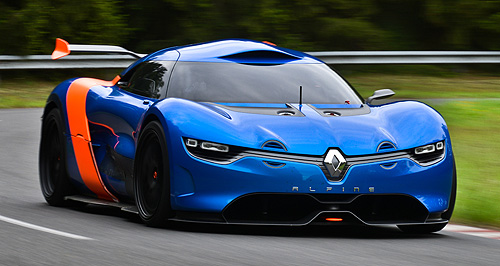News - RenaultAlpine brand revived in Renault, Caterham JVJoint venture: Renault and Caterham will each have a 50 per cent stake in new company Societe des Automobiles Alpine Caterham that will be based at Dieppe, north-west of Paris. Franco-British joint venture to revive Renault’s Alpine brand, expand Caterham range6 Nov 2012 RENAULT and Caterham are extending their Formula 1 collaboration onto public roads with the announcement of a 50:50 joint venture that will result in the co-development and production of new sportscars and a revival of the historic Alpine brand. The first products will reportedly emerge in 2015 or 2016 as a pair of lightweight two-seaters using an alloy chassis, with the Renault Alpine car likely to be a coupe and the Caterham version a convertible. A price range of €40,000-€50,000 ($A49,000-$A62,000) has been hinted by Renault chief operating officer Carlos Tavares, reaffirming comments by global Renault brand vice-president Christian Pouillaude in September that a “lightweight, affordable” Alpine project was coming. This appears to rule out a production version of the wild Alpine A110-50 concept revealed at the Monaco Grand Prix in May as a 50th anniversary tribute to the iconic original A110 Berlinette first seen at the 1962 Paris motor show – but the production cars are likely to take cues from its styling. Caterham Group chairman and AirAsia founder Tony Fernandes described the joint venture as “a huge opportunity to replicate the AirAsia model and give consumers access to exciting, affordable products that marry our interests in F1 and technology and help make their dreams come true”.  Left: Caterham Group chairman Tony Fernandes. Left: Caterham Group chairman Tony Fernandes.According to British journal Autocar Mr Fernandes revealed the new products will be “similarly affordable” as the Caterham Seven (priced in Australia from around $57,000 plus on-road costs). Mr Fernandes also pointed out the only other F1 teams to produce road cars are Ferrari and McLaren, which are “exceedingly expensive”. “The affordability of our car will be key if we get the quality and the price right it will sell, recession or no recession,” he said. Mr Fernandes also spoke of Caterham morphing into a more mainstream car brand with SUVs and city cars, plus a “true halo car” that could be a supercar drawing from Caterham’s experience with F1 technology. A new company called Societe des Automobiles Alpine Caterham will be formed in January by Caterham taking a 50 per cent stake in the currently 100 per cent Renault-owned Automobiles Alpine Renault company that is based in the coastal town of Dieppe, about 150 kilometres north-west of Paris. The 76,000-square-metre facility employs more than 300 staff, currently builds road-going and race versions of the Clio RS hot hatch, and will be used to produce vehicles developed through the new joint venture. Both companies will contribute their technical know-how to product development and will equally share engineering and industrial investments “in the spirit of a true partnership”. The joint venture is the latest twist in a long and sometimes bitter history between Renault, Caterham and Lotus. Caterham started out as the licenced manufacturer of the Lotus 7 road car and was taken over last year by Mr Fernandes, who was involved in a legal battle over use of the Lotus name in Formula One with the new owners of the former Renault works team. The result was that both teams ended up with Renault race engines, the ex-Renault team gained sole use of the Lotus name and Mr Fernandes’ team changed from Lotus to Caterham. Existing Caterham production models such as the Seven – which remains based on the Lotus 7 of the 1950s – could follow the F1 lead and eventually ditch their Ford powerplants in favour of Renault units. To this end, the announcement issued from Europe overnight said: “Caterham Cars is able to combine its engineering excellence with the manufacturing and production capabilities of Renault to create a Caterham vehicle of even greater potential. “This new vehicle will still possess the fundamental DNA of the Seven, which remains in production in Dartford, UK.” Both brands have a proud sporting history, Renault through its iconic Alpines and modern-era Renaultsport hot hatches, and Caterham with four decades of experience bringing race-bred dynamics to the road via its Seven. Caterham has expertise in lightweight composite construction and the Renaultsport Spider produced in the late 1990s used an aluminium chassis construction. The new cars could take advantage of Renaultsport’s potent four-cylinder engines as used in the next-generation Clio RS (149kW/240Nm from 1.6 litres) and current Megane RS265 (195kW/360Nm from 2.0 litres). Renault’s F1 alliance with the Williams F1 team resulted in the limited-edition Clio Williams hot hatch, which sported a 110kW 2.0-litre four-cylinder engine (heavily modified from the 1.8-litre donor unit), a wider front track with blistered wheelarches to match, a bonnet vent and gold Speedline alloy wheels.  Read more |
Click to shareRenault articlesResearch Renault Motor industry news |


















Facebook Twitter Instagram